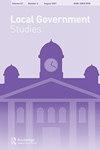Special issue: city network activism and the governance of migration
IF 1.9
4区 管理学
Q2 POLITICAL SCIENCE
引用次数: 2
Abstract
In August 2021, the coming to power of the Taliban led to the exile of thousands of Afghan citizens, fearing for their lives. Images of the mass exodus and the accompanying chaos and distress at Kabul airport appalled citizens worldwide. Yet, as was the case with Syria in September 2015, national political leaders, especially from European Union (EU) member states, adopted an ambiguous discourse, referring to the moral duty to welcome refugees while stressing the need to protect their borders from what they perceive as future ‘irregular’ migration and potential security threats. In response to this repeated emphasis on preventing migration flows, several mayors across the world expressed their desire to welcome Afghan exiles into their cities, notably calling on national governments ‘to immediately open their doors to Afghan refugees and provide the resources needed to facilitate resettlement’. This type of city-mobilisation in favour of exiles results from collective dynamics, institutional constraints and strategic action. Transnational city networks (TCNs) provide a good illustration of such processes, as cities – considered here as collective actors consisting first and foremost of municipal and local authorities, but also of civil society organisations, citizens and interest groups as well as business leaders – connect in order to call for greater recognition of their roles in the governance of migration. Indeed, city networks tend to be positioned as intermediaries between national and supranational institutions – both of which set the rules for migration policies – and subnational governments, which are more involved in the reception of exiles on a day-to-day basis. For instance, in June 2021, several European mayors, members of civil society organisations, representatives of European institutions, and academics participated in the international conference ‘From特刊:城市网络行动主义与移民治理
2021年8月,塔利班掌权导致数千名阿富汗公民流亡,他们担心自己的生命安全。大规模逃亡的画面以及随之而来的喀布尔机场的混乱和痛苦使全世界的公民感到震惊。然而,正如2015年9月的叙利亚事件一样,各国政治领导人,尤其是欧盟成员国的政治领导人,采用了一种模棱两可的话语,一方面提到欢迎难民的道德责任,另一方面强调有必要保护其边境,使其免受他们认为的未来“非正规”移民和潜在安全威胁的影响。为了回应这种反复强调防止移民流动的做法,世界各地的几位市长表达了欢迎阿富汗流亡者进入他们城市的愿望,特别是呼吁各国政府“立即向阿富汗难民敞开大门,并提供必要的资源,以促进重新安置”。这种有利于流亡者的城市动员是集体动力、制度约束和战略行动的结果。跨国城市网络(tcn)很好地说明了这一过程,在这里,城市被视为主要由市政和地方当局组成的集体行为体,但也包括民间社会组织、公民和利益团体以及商业领袖,它们相互联系起来,呼吁人们更多地认识到它们在移民治理中的作用。事实上,城市网络往往被定位为国家和超国家机构之间的中介——两者都制定移民政策的规则——以及地方政府之间的中介,后者更多地参与接收流亡者的日常工作。例如,2021年6月,几位欧洲市长、民间社会组织成员、欧洲机构代表和学者参加了“从
本文章由计算机程序翻译,如有差异,请以英文原文为准。
求助全文
约1分钟内获得全文
求助全文
来源期刊

Local Government Studies
Multiple-
CiteScore
4.80
自引率
15.80%
发文量
43
期刊介绍:
Local Government Studies is the leading journal for the study of local politics, policy, public administration and management and governance. First established in 1975, it is an influential forum for critical dialogue and exchange on local government and a vital resource for academics, politicians, policy makers and practitioners internationally. The editors welcome submissions in this field, particularly work of a comparative, methodologically innovative and theoretically challenging nature.
 求助内容:
求助内容: 应助结果提醒方式:
应助结果提醒方式:


